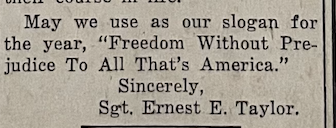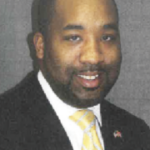
On Feb. 24, 1944, The Covington Leader published a letter from Sgt. Ernest Eugene Taylor, of Mason, commemorating what was then known as Negro History Week. In his letter, Taylor spelled out his hopes for progress with race relations in the coming year.
The letter, in its entirety, reads:
(Editor’s note: The following letter was received Friday from Sgt. Ernest Eugene Taylor, who is serving with the U.S. Army somewhere in England. Sgt. Taylor, a son of Robert and Annie Taylor of Mason, is a graduate of Hoffman-St. Mary’s (Gailor Industrial School). He entered in service February, 1942).
Editor Leader:
It has just come to my attention that Sunday, 7th February, 1944, commences National Negro History Week. Being one of the thousands of soldiers that are serving in every field of operations I feel delegated to write you a message that may be considered of primary importance during the present crisis.
Since we are celebrating a week of accomplishment of the Negro in the past 79 years, our thoughts during the week will call to memory our many successes and failures. We like to think of success that has been so much that it overshadows our failures. We all should feel proud of the contributions we have made to America and to the civilized world.

In spite of the fact that we have advanced considerably during this period of time, we still have much that is not yet accomplished. I feel that it is our responsibility and our task to carry on where others have left off. Many have done their just share and passed on to the great beyond – the unknown. When I say this I think of such men as Frederick Douglas, Booker T. Washington, and the late Dr. George Washington Carver, the world’s most famous scientist, and countless others to be remembered.
We also have living examples, the symbols of life – Paul Robeson, Marion Anderson, Lena Horne, Joe Louis, Jesse Owen, Roland Hayes, and the “Man O’ War,” to whom we all look with pride, Brigadier General Benjamin O. Davis Sr. We should be and are proud of these who have done so much for the welfare of our people.
With these thoughts in mind and with the passing of another week of Negro progress, “History Marches On.” We are ready to face another year which we hope will be a more progressive one for the entire nation, a year that will bring us victory.
In the year that is ahead we hope and pray with confidence that it will bring to America and all Christian nations who believe in the rights of life, liberty and happiness – a peace that does not know the toils of war. We look for a peace in which all men everywhere shall feel and be free to pursue their course in life.
May we use as our slogan for the year, “Freedom Without Prejudice to All That’s America.”
Sincerely,
Sgt. Ernest E. Taylor
It was not unusual for The Leader to publish letters from the warfront, but it wasn’t common for those letters to be written by African-American soldiers.
This is believed to be one of the first, if not the first, mention of Negro History Week in The Leader. Negro History Week was established by Carter G. Woodson in February 1926 and extended to Black History Month in 1970 by Black educators and the Black United Students at Kent State University.
Taylor registered for the draft on July 1, 1941 and was enlisted on May 21, 1942, according to his World War II draft card and the U.S. Social Security Administration. He was discharged from the Army on Nov. 28, 1945.
One of nine children born to Robert and Annie William Taylor, he was born on Jan. 29, 1920, grew up in Mason and attended at least one year of college, according to the 1940 census. The following year he said he was a farmer, employed by his father.
Following the war, he married Christine D. Coleman in Hot Springs, Ark. on June 27, 1948 and died in September 1978.






Leave a Reply